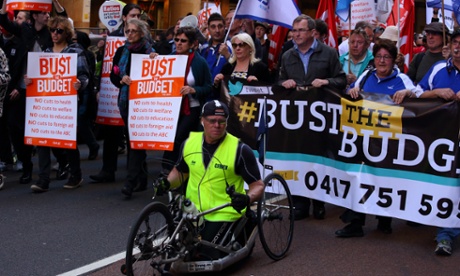The Abbott government has learned the hard way that a wide-ranging policy agenda of small ticket savings annoys almost everyone. Take note, Labor

A striking feature of the Abbott government’s first budget is that it offended just about every sector or interest group in the economy, while doing precious little to return the budget to surplus.
The net savings to the budget over the three years to 2016-17 totalled $18.2 billion – or around 0.3 per cent of GDP each year. Such a puny fiscal tightening leaves the budget in deficit in that time, and the bottom line is worse than the budget numbers left by the previous government in the pre-election fiscal outlook.
The first issue that the budget had to deal with was covering Tony Abbott’s spending spree on paid parental leave, roads and the medical research future fund. Next, it had to cover the huge loss of revenue from abolishing the carbon price and the mining tax, from and cutting the company tax rate by 1.5 percentage points to 28.5%. The challenge in the budget was getting back to square one after these expensive pet projects were funded.
This is where the budget measures annoyed and offended so many sections of the electorate. Drivers didn’t like the indexation of the fuel excise. Those interested in a university education – students and their parents – didn’t like the deregulation of fees and the move to the 10 year government bond yield as the interest rate charged on university debt.
The cut to pension indexation offended many pensioners and the lift in the retirement age to 70 years was seen by many to be too much, especially for manual workers.
Then there was the Medicare co-payment, which hit everyone, but especially low income earners. When some of the details of that cost were uncovered, it was seen to be a step too far away from the concept of universal health coverage. The changes to the unemployment benefit payments for the under 30s was again seen to be draconian and unfair.
Even the cuts to the ABC and SBS hit voters who not only long for their dose of Midsomer Murders and Q&A, but also those in rural communities fearful that local news and issues-based programs will be compromised with the loss of funds.
Furthermore, the high income earner tax hike, which increased the marginal tax rate for earnings above $180,000 a year by 2%, saw these voters look at the government in a less favourable light.
For those few who were not affected in some way by this smorgasbord of fiscal tightening measures, there appears to have been a common feeling that one or other of these policy changes were simply unfair and unnecessary.
Drivers, the sick, those who value education, the old, unemployed youth, ABC viewers and high income earners were all directly hit by the budget measures.
This broad-based fiscal hit is probably why consumer sentiment fell by more than 15% and is still at disconcertingly low levels. It could also explain the sharp falls in retail spending, as consumers pare back spending in anticipation to these measures coming into play.
With continued and unrelenting trash talking of the economy by the government as they refer to the budget “crisis”, “disaster” and “need for repair”, the mood of the business sector is also starting to sour, despite low interest rates and improving global economic conditions. The Roy Morgan measure of business confidence has fallen over 20% since the election and is now at a two year low.
The government’s budget marketing problem is self-inflicted. Given that most of the scatter-gun of budget measures were not flagged prior to the election, voters were surprised to see the government pursue its fiscal objectives in this way. Indeed, during the election campaign in 2013, the words of Abbott and his fellow frontbenchers were the polar opposite for most issues.
For Labor, as it works to frame a credible fiscal and economic policy agenda into the 2016 election, the lesson of the 2014 budget should be clear. A wide-ranging policy agenda of small ticket savings to maintain key fiscal targets, including a balanced budget over the course of the cycle, is poison.
If Labor wants to pursue a constructive agenda, the “tough” policies needed to fund it – yet maintain the balanced budget over the cycle – should be directed at a narrower constituency. Even at this distance from the election, those targets seem obvious: superannuation and corporate welfare. Those areas would deliver huge savings that are not only fair and equitable, but will help to cover the cost of undoing some of the current government’s policy overreach – and could also fast track the budget to surplus.
